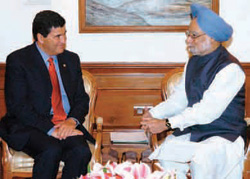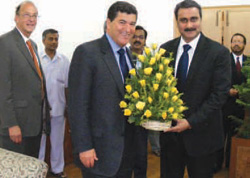
During his recent visit to India, NIH Director Dr. Elias Zerhouni (left) met with Manmohan Singh, Prime Minister of India, to discuss NIH's substantial medical research collaborations with India.
Photo courtesy of NIH
Recently, NIH Director Dr. Elias Zerhouni traveled extensively in India, Africa, Pakistan, and Afghanistan, discussing with medical experts and government officials the issues of world health and NIH's global outreach. He spoke with MedlinePlus' Christopher Klose on these topics.
What are the major challenges facing medical research in today's increasingly interconnected world?
Dr. Zerhouni: We need a health system for the world, not a
healthcare system. We cannot continue to practice the medicine of today 30 years from now. Treatment is often too late and very expensive.Thanks to today's science, we understand that a stroke, heart attack, or cancer begins years before it occurs. We can intervene. If someone is going to develop Alzheimer's or diabetes, I would rather find out much earlier—and do something about it. That's preemptive medicine.
With resources growing scarce, how are you going to change
the old, curative model?
Dr. Zerhouni: The science has advanced to the point where we can become more preventative. Also, the landscape of disease has changed. In developing countries you now see the diseases of the rich—heart disease, high blood pressure, diabetes. We must strike them before they take us. This means being more predictive of knowing who is more likely to be at risk and why so that we can intervene on their behalf. But being predictive will require medicine to become personalized.
Could you give an example of personalized medicine?
Dr. Zerhouni: NIH-funded researchers discovered that a new lung cancer drug worked beautifully—but only on 10 percent of the people tested. Turns out they shared a certain gene the majority being tested didn't, but which happens to be common to 40 percent of Asian populations. Such discoveries will lead to more effective, less-costly treatment that is personalized and pre-emptive. But this will require global participation.
Under your leadership, NIH funding for international research has risen significantly. How does this benefit the American taxpayer?
Dr. Zerhouni: Diseases know no borders anymore. SARS [severe acute respiratory syndrome] spread through the world in a matter of days. The dangers of fast-moving infectious diseases require us to have a global vision. Without a worldwide network of welltrained, qualified scientific collaborators, we won't have the radar to protect the American public from emerging and re-emerging infections, like pandemic flu. That's why it was very important to increase our presence around the world.
Second, the world is going to grow to nine billion people in 2050, but not equally. In the developing world, people will continue to contract diseases like malaria. They will also suffer as we do from obesity, diabetes, and heart disease.
From the American taxpayer's standpoint, therefore, I'm interested in what we can learn from studying countries that are where we were 30 years ago. These are natural laboratories. Perhaps, together we can discover what causes obesity and fix it. This is why we must collaborate and train scientists worldwide. Science knows no frontiers.

Dr. Zerhouni receives a bouquet from Indian Minister of Health and Family Welfare Dr. Anbumani Ramadoss. Dr. Roger Glass (left) is Director of the NIH Fogarty International Center.
Photo courtesy of NIH
Are you encouraged by what is happening around the world to improve peoples' health?
Dr. Zerhouni: On my recent trip to Africa, India, Pakistan, and Afghanistan, I was pleased to find that NIH, especially the Fogarty International Center, is playing an essential role. So many local doctors told me proudly they had been Fogarty Fellows. In Africa, especially, there is good news. We have the Gates Foundation and its commitment to global health. We also have the Presidential Plan for AIDS Relief and the Global Fund for AIDS, Malaria, and Tuberculosis. Billions of dollars have been mobilized to find new cures and treatments.
Most important was how dedicated the people are to their own countries and cultures, and their degree of knowledge and skills. It is essential for global health that we have such experts and that NIH continue to provide support.
Is this fulfilling what you term NIH's global responsibility to health?
Dr. Zerhouni: Absolutely. We are all responsible for making medicine different in 2030. It's a race against time, and winning depends on leadership—here and abroad—and the sense that we all benefit because we are interdependent.
A new exhibition at the National Library of Medicine, "Against the Odds: Making a Difference in Global Health," celebrates some of the key leaders in the global health revolution. How can the average American help to improve healthcare in other countries?
Dr. Zerhouni: Americans should be proud of what they do through their tax dollars and their volunteering. In Uganda, I met an oilman from Texas. He'd known nothing about infectious diseases, but had come to help because he "knew something
about drilling wells." I'll say! On his own time and money, he's set up a very beneficial program. Going from village to village, he tests the water and drills the wells that provide safe drinking water, thereby eliminating the diarrhea that ails so many, many children.
You've been quoted as saying, "Finding better ways of educating the world is the best vaccine out there." What do you mean?
Dr. Zerhouni: Yes. For example, there are regions where people believe that malaria comes from ripened fruit. A mosquito net makes absolutely no sense for protecting their children; they want it for fishing. Knowledge is power and education is essential to good public health. If you know that water conveys disease, then you know to filter the water.
"Finding better ways of educating the world is the best vaccine out there."
How do you see communications helping to change today's healthcare into the predictive, personalized health system you envision?
Dr. Zerhouni: Medicine of the future is going to be predictive, personalized, pre-emptive, and—participatory, which means networks of like-minded people with the same disease working together, understanding and educating each other across the world. This will require people to participate in their own care to the greatest extent possible, and for communities to be committed to assuring their children don't become obese at age 12 and suffer the lifelong consequences.
This cannot happen without transparent, multi-source communication, and connectedness.
Are there any examples of how communication and networking through the Internet have helped people?
Dr. Zerhouni: Cystic fibrosis is a great example of people in isolation who, by coming together and communicating, have helped the science and themselves. Their life expectancy is much longer, the quality of life much higher, and we're not giving up on a cure.
That's really what the NIH is involved in: connecting around the world.
